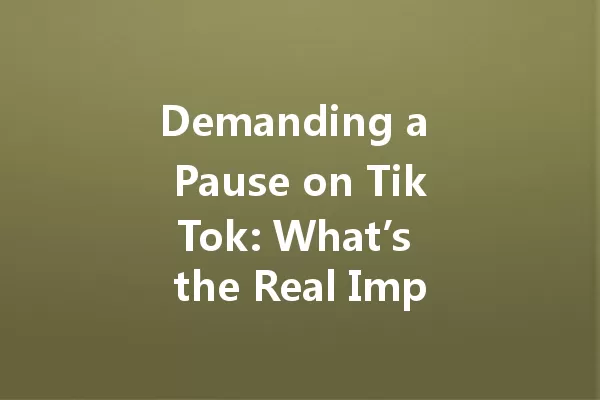
With its explosive growth over the past few years, TikTok has become a major player in the social media landscape. Yet, as its popularity soars, so too do the concerns surrounding the platform. Many experts and advocates are calling for a pause on TikTok to reevaluate its impact on users, particularly younger generations. This comes amid rising fears about data privacy and mental health, prompting us to ask: what would happen if TikTok were to stop operating?
Data Privacy Concerns
Data privacy is one of the most pressing issues associated with TikTok. The app collects vast amounts of information from its users, including location data, device information, and user behavior patterns. In a world where digital privacy is becoming increasingly fragile, this raises serious questions.
Concerns focus particularly on how this data might be used or misused. As governments worldwide tighten regulations around digital privacy, a pause on TikTok could be an opportunity for lawmakers to draft clearer guidelines on data collection and user consent.
Mental Health Implications
The hyper-engaging nature of TikTok content raises significant mental health concerns, especially for users aged 5-12 years. With its endless scroll and quick, dopamine-inducing videos, young users may be at risk of developing anxiety or depression due to comparison culture and cyberbullying.
Several studies have highlighted a strong correlation between social media usage and mental health issues. Experts suggest that a break from TikTok could serve as a much-needed reset for users who may feel overwhelmed by constant exposure to curated lives and idealistic narratives.
Cultural Consequences
TikTok has significantly influenced pop culture, giving rise to trends, challenges, and even music hits. But what happens to these cultural moments if the platform goes dark temporarily?
During a pause, other platforms may see a surge in activity as creators and users migrate to alternatives, such as Instagram or YouTube. This shift could change how trends emerge and evolve, as content would have to adapt to different user demographics and platform algorithms. It raises an intriguing question: what might we lose culturally if TikTok were offline, even for a brief period?
| Platform | User Count (2025 Est.) | Main Audience | Unique Features | Potential Growth |
|---|---|---|---|---|
| TikTok | 1 Billion | Ages 16-24 | Short-form videos, Duets | Stable |
| 2 Billion | Ages 18-34 | Stories, Shopping | Growing | |
| YouTube | 2.5 Billion | Ages 18-44 | Long-form videos, Monetization | Expanding |
A Shift in Content Creation
The content creation landscape is heavily influenced by trends, which often stem from TikTok. If the app were paused, creators would need to pivot their strategies to maintain their audience engagement on other platforms. Since TikTok thrives on quick, consumable content, it poses a challenge for creators to adapt to other formats.
Content conceived for TikTok may not automatically translate well to platforms with longer videos, such as YouTube. Creators might need to think more strategically about how to repurpose their material. This shift could foster innovation as creators explore new formats and storytelling techniques.
Economic Factors
Lastly, the economics surrounding TikTok can’t be ignored. It’s become a lucrative platform for brands and influencers alike, driving sales through viral marketing campaigns. A pause could have ripple effects on advertising budgets and influencer contracts, making brands reassess their strategies.
The marketing landscape would change as companies would either rush to other social media platforms or reconsider their digital presence altogether. This would create a fascinating dynamic for businesses trying to navigate a post-TikTok world.
By putting a spotlight on these various aspects, the conversation around pausing TikTok expands beyond just the app itself. It invites a broader discussion about social media’s role in our lives, data ethics, and cultural evolution.
There are several compelling reasons behind the calls for a pause on TikTok, with data privacy taking center stage. As the app collects an extensive amount of data from its users, including personal information and usage patterns, many individuals and experts are raising alarms about how this information is stored and utilized. The fear is that the data might be mismanaged or even exploited, particularly given the ongoing debates about digital privacy laws. This situation is heightened by the fact that TikTok’s primary user base includes many young people, making data protection for this demographic even more critical.
Additionally, the mental health impacts of TikTok on its younger audience cannot be overstated. The platform’s design, which encourages constant scrolling and quick consumption of media, can lead to feelings of anxiety or inadequacy, particularly among children and adolescents aged 5-12 years who may be more impressionable. The risks associated with social comparison and cyberbullying are significant, prompting calls for a pause to reevaluate the app’s influence. Many advocates believe that hitting the pause button could pave the way for a thorough examination of these pressing issues, leading to better regulations that prioritize user safety while maintaining the platform’s benefits.
FAQ
What are the main reasons for demanding a pause on TikTok?
The primary reasons include concerns over data privacy, the mental health effects on younger users, and the cultural consequences of the platform’s influence. Many believe that a pause could provide an opportunity to reassess these issues and create better regulations.
How could a TikTok pause affect content creators?
A pause may force creators to adapt their content strategies as they migrate to alternative platforms. This could lead to an increase in innovation as they explore different formats and audience engagement techniques, but it also might disrupt their current revenue streams and connections with fans.
What is the age range of TikTok’s main audience?
The app primarily targets users aged 16-24 years, but it has also gained significant traction among younger demographics, especially those aged 5-12 years. This makes concerns about mental health and data privacy particularly relevant for younger users.
Will other social media platforms benefit from a TikTok pause?
It’s likely that platforms such as Instagram and YouTube could see a surge in activity if TikTok were to pause. Many creators and users may shift their focus to these platforms, increasing engagement and potentially leading to new trends.
What impact could a pause have on digital marketing?
A TikTok pause might disrupt current marketing strategies for brands that rely heavily on influencer collaborations and viral content. Companies might need to reassess their digital presence and allocate their advertising budgets to other platforms to reach their target audiences effectively.
内容结尾插入,支持HTML代码,如果不需要请删除